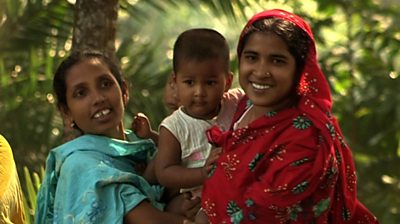Downloads
Publication date: October 2016
The project
Chronic under-nutrition remains a serious issue in Bangladesh. A third (33%) of children under five years of age are stunted (low height for their age) and 8% are severely stunted (Bangladesh Demographic and Health Survey, 2014). Under-nutrition is a complex issue with many contributing factors such as a mother’s own levels of nutrition, her and her family’s knowledge of feeding practices, as well as the birth weight of her baby.
±«Óătv Media Action worked with the Children’s Investment Fund Foundation (CIFF) in Bangladesh to produce a variety of media outputs aimed at raising awareness, knowledge, discussion and practices of priority issues related to maternal and child nutrition.
Programming included six additional episodes of ±«Óătv Media Action’s DFID funded maternal and new-born health drama Ujan Ganger Naiya (“Sailing against the Tide”) and short factual discussion programme Natoker Pore (“After the Drama”). CIFF also funded a Public Service Announcement (PSA) and several mobile ringtones.
Research approach
Qualitative research was undertaken to understand how and why the drama and factual programmes did or did not influence viewers’ knowledge, attitudes, confidence, motivation and behaviour around maternal and child nutrition (nutrition during pregnancy and complementary feeding). Community screenings of the programmes were organised in two rural locations with newly married men and women, mothers and their husbands as well as older female family members. Two weeks after the screenings 12 focus group discussions were completed with participants.
Key findings
- Identification with storylines in the drama and the real-life experiences explored in the factual programme were critical to viewers’ engagement with, and ability to absorb new, information in the programmes.
- Illustrating the tragic consequences of not adhering to recommended practices was a powerful way to engage viewers emotionally and drive learning.
- Viewers felt the drama and factual programmes had improved their knowledge. They described better awareness of the importance of appropriate nutrition for pregnant women, including the variety of foods she should have.
- Learning gained from the programmes made viewers feel more confident that they could oppose traditional practices, such as feeding new born babies local food rather than only colostrum and milk. They felt the programmes had reinforced their knowledge of neo-natal care, including the benefits of colostrum, the importance of exclusive breastfeeding in the first six months, when to introduce complimentary foods and which foods a baby can have.
- Viewers especially learned when detailed and specific practical information was delivered in a straight forward and repetitive way such that complementary feeding should start from 181 days, or that babies need to eat 3/5 meals depending on their age.
- Almost all of the study participants had talked about and shared practical advice from the programme with friends or family members.
- Husbands described how the drama made them feel that they should take a more proactive role in taking care of their wives’ nutrition and health during pregnancy. For example, some husbands of pregnant women reported having bought more vegetables and fruits, and asked their wives for their preferences, something they hadn’t done before.
Implications
To build knowledge and improve motivation to act or change behaviour, it is critical that content is realistic and relevant to target audiences.
It is evident from this research and from the Randomised Control Trial (RCT)* carried out on these programmes that the use of both drama and factual programming is beneficial for communicating maternal and child health issues and should continue to be used.
Older female family members are a key influence on family nutrition practice. Husbands are also influential because of their traditional responsibility for grocery shopping and lack of other health information sources. Both of these groups, alongside mothers, should continue to be key target audiences for maternal and child nutrition interventions in Bangladesh.
*Findings of the RCT can be found .
